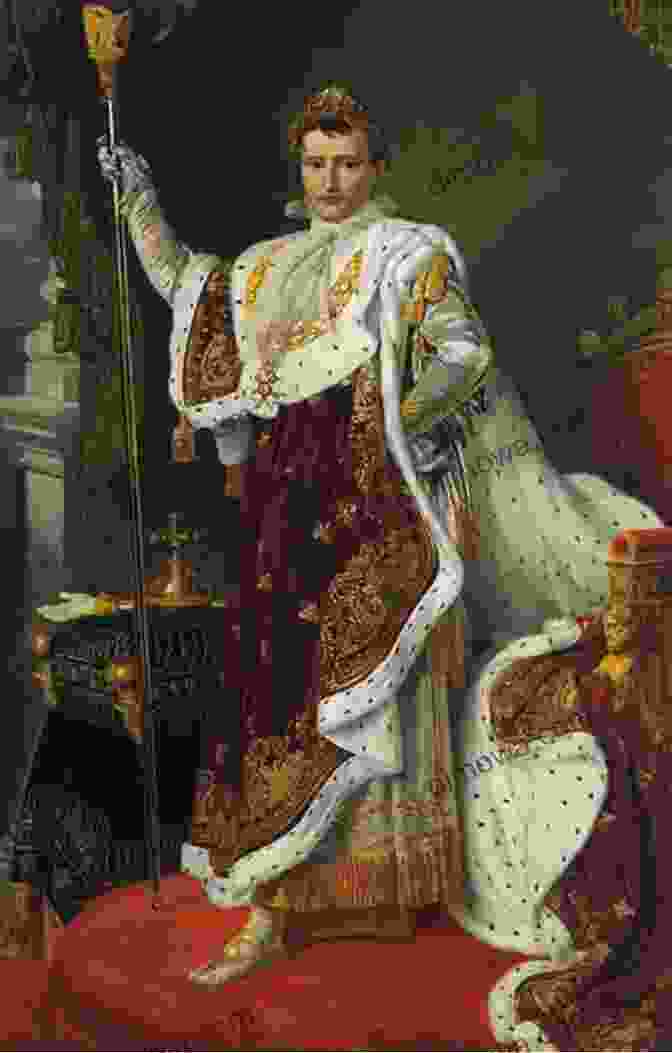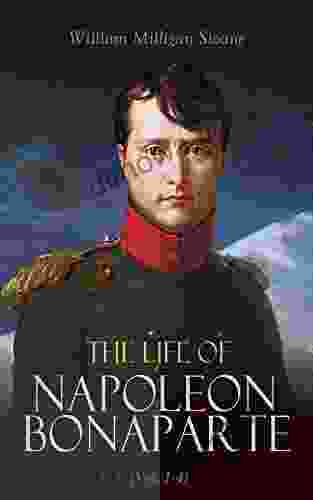Napoleon Bonaparte: A Life of Conquest and Empire


Napoleon Bonaparte, one of history's most iconic figures, was a military and political leader who rose from obscurity to become Emperor of the French. His brilliant military campaigns and his impact on French society and culture continue to fascinate and inspire people to this day.
4.3 out of 5
| Language | : | English |
| File size | : | 4547 KB |
| Text-to-Speech | : | Enabled |
| Screen Reader | : | Supported |
| Enhanced typesetting | : | Enabled |
| Word Wise | : | Enabled |
| Print length | : | 1466 pages |
This article will provide a comprehensive overview of Napoleon's life, from his early years to his rise to power, his military campaigns, and his eventual downfall. We will also explore his legacy and the lasting impact he has had on the world.
Early Life and Education
Napoleon Bonaparte was born on August 15, 1769, in Ajaccio, Corsica. He was the fourth of eight children born to Carlo Bonaparte, a lawyer, and Letizia Ramolino. Napoleon's early life was marked by poverty and political turmoil. Corsica was a French possession, but it was also a hotbed of nationalist sentiment. Napoleon's father was a supporter of Corsican independence, and he was forced to flee the island when Napoleon was just a child.
Napoleon and his family moved to mainland France, where he attended military school. He excelled in his studies and quickly rose through the ranks. By the age of 24, he was a captain in the French army.
Rise to Power
In 1796, Napoleon was given command of the French army in Italy. He quickly proved to be a brilliant military strategist and tactician. In a series of dazzling victories, he defeated the Austrian and Sardinian armies, and he forced the Austrians to sign the Treaty of Campo Formio in 1797. This treaty gave France control of much of northern Italy.
Napoleon's success in Italy made him a national hero in France. He was hailed as a savior of the republic, and he was soon appointed commander of the French army in Egypt. However, his Egyptian campaign was a disaster. He was defeated by the British at the Battle of the Nile, and he was forced to evacuate Egypt in 1799.
Despite his setbacks in Egypt, Napoleon remained a popular figure in France. He returned to Paris in 1799 and staged a coup d'état, which overthrew the Directory and established the Consulate. Napoleon became First Consul, and he effectively became the dictator of France.
Emperor of the French
In 1804, Napoleon crowned himself Emperor of the French. He established a new empire, modeled after the Roman Empire. He centralized the French government, reformed the legal system, and created a new nobility. He also expanded French territory, conquering much of Europe.
Napoleon's reign was marked by both great achievements and great failures. He was a brilliant military leader, and he won many decisive battles. He also reformed French society and culture, and he established many institutions that still exist today. However, his ambition ultimately led to his downfall.
Military Campaigns
Napoleon's military campaigns were some of the most brilliant and successful in history. He won decisive victories over the Austrians, Prussians, Russians, and British. He conquered much of Europe, and he established the French Empire.
Napoleon's military success was due to a combination of factors. He was a brilliant strategist and tactician. He was also able to inspire his troops to fight with courage and determination. Napoleon's army was also well-trained and equipped, and it benefited from the latest technology.
However, Napoleon's military campaigns also had their setbacks. He suffered a major defeat at the Battle of Trafalgar in 1805, which gave the British control of the seas. He also suffered a disastrous defeat in Russia in 1812, which led to his downfall.
Downfall and Death
In 1814, Napoleon was forced to abdicate after a series of defeats. He was exiled to the island of Elba. However, he escaped from Elba in 1815 and returned to power. He was defeated again at the Battle of Waterloo in 1815, and he was exiled to the island of Saint Helena.
Napoleon died on Saint Helena on May 5, 1821, at the age of 51. He was buried on the island, but his remains were later returned to France in 1840.
Legacy
Napoleon Bonaparte was one of the most important figures in history. He was a brilliant military leader, a gifted statesman, and a visionary reformer. He left a lasting legacy on France and on the world.
Napoleon's military campaigns reshaped the map of Europe. He established the French Empire, which lasted for more than a decade. He also introduced new military tactics and strategies that would continue to be used for centuries to come.
Napoleon's reforms had a profound impact on French society and culture. He centralized the French government, reformed the legal system, and created a new nobility. He also established new schools and universities, and he encouraged the arts and sciences.
Napoleon's legacy is complex and controversial. He was a brilliant leader, but he was also a ruthless dictator. He conquered much of Europe, but his ambition ultimately led to his downfall. However, there is no doubt that Napoleon was one of the most influential figures in human history.
Napoleon Bonaparte was a man of contradictions. He was a brilliant military leader, but he was also a ruthless dictator. He conquered much of Europe, but his ambition ultimately led to his downfall. However, there is no doubt that Napoleon was one of the most influential figures in human history. His legacy continues to be debated today, but there is no denying his impact on the world.
4.3 out of 5
| Language | : | English |
| File size | : | 4547 KB |
| Text-to-Speech | : | Enabled |
| Screen Reader | : | Supported |
| Enhanced typesetting | : | Enabled |
| Word Wise | : | Enabled |
| Print length | : | 1466 pages |
Do you want to contribute by writing guest posts on this blog?
Please contact us and send us a resume of previous articles that you have written.
 Book
Book Novel
Novel Page
Page Chapter
Chapter Text
Text Story
Story Genre
Genre Reader
Reader Library
Library Paperback
Paperback E-book
E-book Magazine
Magazine Newspaper
Newspaper Paragraph
Paragraph Sentence
Sentence Bookmark
Bookmark Shelf
Shelf Glossary
Glossary Bibliography
Bibliography Foreword
Foreword Preface
Preface Synopsis
Synopsis Annotation
Annotation Footnote
Footnote Manuscript
Manuscript Scroll
Scroll Codex
Codex Tome
Tome Bestseller
Bestseller Classics
Classics Library card
Library card Narrative
Narrative Biography
Biography Autobiography
Autobiography Memoir
Memoir Reference
Reference Encyclopedia
Encyclopedia Melissa Marr
Melissa Marr Will Hart
Will Hart Lakia
Lakia Tom Allen
Tom Allen I R Wright
I R Wright Dorothea Benton Frank
Dorothea Benton Frank Steve Badillo
Steve Badillo Sarah Retter
Sarah Retter Leigh Walker
Leigh Walker Thomas Bunstead
Thomas Bunstead Joe Slowinski
Joe Slowinski Tony Francis
Tony Francis T Rae Mitchell
T Rae Mitchell Vivien Gorham
Vivien Gorham Kellie Hailes
Kellie Hailes Kasie West
Kasie West Stuart A Kallen
Stuart A Kallen Susanne A Denham
Susanne A Denham Willow Night
Willow Night Tui Snider
Tui Snider
Light bulbAdvertise smarter! Our strategic ad space ensures maximum exposure. Reserve your spot today!

 Samuel BeckettDelve into the Enchanting World of Mages: A Literary Masterpiece Unveiling...
Samuel BeckettDelve into the Enchanting World of Mages: A Literary Masterpiece Unveiling... Truman CapoteFollow ·16k
Truman CapoteFollow ·16k Rob FosterFollow ·16.3k
Rob FosterFollow ·16.3k Dave SimmonsFollow ·4.7k
Dave SimmonsFollow ·4.7k José MartíFollow ·10.4k
José MartíFollow ·10.4k Leon FosterFollow ·13.1k
Leon FosterFollow ·13.1k Dalton FosterFollow ·17.4k
Dalton FosterFollow ·17.4k Harold PowellFollow ·8.2k
Harold PowellFollow ·8.2k Carl WalkerFollow ·5k
Carl WalkerFollow ·5k

 F. Scott Fitzgerald
F. Scott FitzgeraldLove Me Better, Love Me Right: A Journey of...
Unveiling the Profound Power of Emotional...

 Eddie Powell
Eddie PowellHow To Make Your Muzzleloader Most Effective And Keep It...
In the realm of firearms, muzzleloaders hold...

 Andy Hayes
Andy HayesPrepare Mentally, Physically, and Emotionally for the...
Embark on a Transformative Odyssey to...

 Oliver Foster
Oliver FosterThe Bittersweet Bride: Advertisements for Love
A Poignant...
4.3 out of 5
| Language | : | English |
| File size | : | 4547 KB |
| Text-to-Speech | : | Enabled |
| Screen Reader | : | Supported |
| Enhanced typesetting | : | Enabled |
| Word Wise | : | Enabled |
| Print length | : | 1466 pages |














